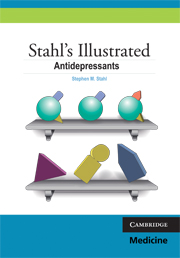Book contents
- Frontmatter
- Preface
- Contents
- CME Information
- Objectives
- Chapter 1 Neurobiology of Depression
- Chapter 2 Selective Serotonin Reuptake Inhibitors (SSRIs) and Serotonin Norepinephrine Reuptake Inhibitors (SNRIs)
- Chapter 3 Norepinephrine and Dopamine Reuptake Inhibitors (NDRIs) and Selective Norepinephrine Reuptake Inhibitors (NRIs)
- Chapter 4 Alpha 2 Antagonists as Serotonin and Norepinephrine Disinhibitors (SNDIs) and Serotonin Antagonist/Reuptake Inhibitors (SARIs)
- Chapter 5 Monoamine Oxidase Inhibitors (MAOIs) and Tricyclic Antidepressants (TCAs)
- Chapter 6 Building a Treatment Plan with Novel Treatment and Augmentation Options For Depression
- Chapter 7 Depression in Women: Treating Symptoms Throughout the Life Span
- Chapter 8 Pharmacokinetics and Algorithms to Treat Depression
- Summary
- Abbreviations and Symbols
- Suggested Readings
- Index
- CME: Posttest
CME Information
Published online by Cambridge University Press: 19 October 2021
- Frontmatter
- Preface
- Contents
- CME Information
- Objectives
- Chapter 1 Neurobiology of Depression
- Chapter 2 Selective Serotonin Reuptake Inhibitors (SSRIs) and Serotonin Norepinephrine Reuptake Inhibitors (SNRIs)
- Chapter 3 Norepinephrine and Dopamine Reuptake Inhibitors (NDRIs) and Selective Norepinephrine Reuptake Inhibitors (NRIs)
- Chapter 4 Alpha 2 Antagonists as Serotonin and Norepinephrine Disinhibitors (SNDIs) and Serotonin Antagonist/Reuptake Inhibitors (SARIs)
- Chapter 5 Monoamine Oxidase Inhibitors (MAOIs) and Tricyclic Antidepressants (TCAs)
- Chapter 6 Building a Treatment Plan with Novel Treatment and Augmentation Options For Depression
- Chapter 7 Depression in Women: Treating Symptoms Throughout the Life Span
- Chapter 8 Pharmacokinetics and Algorithms to Treat Depression
- Summary
- Abbreviations and Symbols
- Suggested Readings
- Index
- CME: Posttest
Summary
CME credit has expired for this activity (2/28/15). You are welcome and encouraged to complete the activity and posttest for your personal enrichment, but will not be able to receive credit nor print a certificate for this activity.
(Original CME Information)
Overview
This book aims to visually explain the concepts behind the neurobiology of depression, as well as the current and novel treatment options available to clinicians to treat depression. The book is divided into eight chapters for ease of reading and referencing. Chapter 1 focuses on the neurobiology behind depression, with an emphasis on the neurotransmitters involved in the experience of depressive symptomatology: serotonin, norepinephrine and dopamine. Chapter 2 begins the introduction of antidepressant drug classes, with an overview and in-depth explanation of each drug in the SSRI and SNRI classes. Chapter 3 covers NDRIs and NRIs; Chapter 4 features SNDIs and SARIs; Chapter 5 examines the older generation of antide-pressants— MAOIs and TCAs; and Chapter 6 introduces novel treatment options for managing depression. Chapter 7 focuses on depression in women, emphasizing the role that estrogen plays in the experience of depressive symptomatology. Chapter 8 reviews the pharmacokinetics of antidepressants, and introduces algorithms commonly used to treat depression. The visual component of this book is designed to allow the reader to easily grasp complex concepts.
Target Audience
This activity has been developed for prescribers specializing in psychiatry. There are no prerequisites. All other health care providers interested in psychopharmacology, are welcome for advanced study.
Statement of Need
• The following unmet needs and professional practice gaps regarding antidepressants were revealed following a critical analysis of activity feedback, expert faculty assessment, literature review, and through new medical knowledge:
• Not all antidepressants are efficacious in all patients; thus, it is important for mental health professionals to be aware of alternative options.
• Full remission and recovery is still the gold standard for depression, yet only 50% of responders actually achieve remission.
• The most common residual symptoms of treatments for depression are insomnia, hypersomnia and physical fatigue/pain, and executive dysfunction.
To help address clinician performance deficits with respect to treating depression, quality improvement efforts need to provide education that will increase understanding of the neurobiology of psychiatric disease states and the pharmacology of available, new, and in-development medications.
- Type
- Chapter
- Information
- Stahl's Illustrated Antidepressants , pp. vii - xPublisher: Cambridge University PressPrint publication year: 2009



